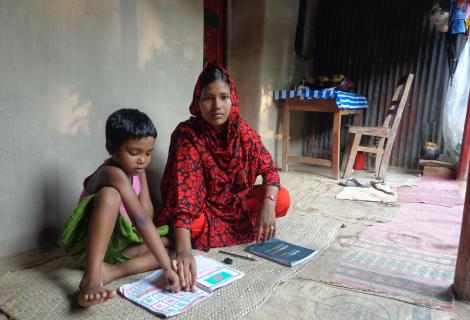Has gender equality been put into lockdown?

Young women are carrying the burden of Covid-19 lockdowns by doing more unpaid care work while helping their parents during school closures.
By Mohammad Hanif and Gudrun Gadegaard Pedersen
Covid-19 has altered the lives of women and men worldwide. In lockdown, we became teachers, nurses, cooks and caregivers, all at the same time. This has not only affected parents and adults, but young people too. Daughters and sons are taking on care and domestic tasks at home, but the burden is not being shared equally.
The gender gap is striking. In Bangladesh UN Women estimates that 51% of women, but only 31% of men, doing at least 3 daily activities say their time spent on unpaid care work has increased since the start of the pandemic.
In Bangladesh, normally, girls and young women go to school or work. Under lockdown, they stayed at home, where they spend more time doing household work. Most men and boys don’t work much in the home, so this responsibility falls to the women and girls.
Many women and girls work from dawn to night and are unable to devote time to their education or career.
In the Asia-Pacific region, young women and girls have taken on a substantial share of unpaid care and domestic work since the outbreak of Covid-19. Data from the United Nations shows 67% of parents said that their daughters help more around the home, but only 57% said the same about their sons. If parents are employed, the gender difference is even greater: 70% of daughters, but only 58% of sons, help their employed parents.
These increases are in addition to workloads, that were already heavy, before lockdown. Before the Covid-19 crisis, according to data from the OECD, women in Bangladesh already spent 3.8 times more hours on unpaid care work than men, and time diaries kept by women as part of an ActionAid Bangladesh study on the impact of unpaid care work, show that women only spent one hour a day on paid work.
Traditional gender roles lead to gendered expectations in young Bangladeshi women and men. Girls spend more time on unpaid care work than boys, and gender roles are defined from an early age. In many homes, boys are not allowed to go to the kitchen, and they are not allowed to wash their clothes. Women and girls must do all of this.
Lockdown was a stark warning of what can happen when public services are shut down. Women and girls are the first to experience the negative impact of cuts to public services. But the good news is that expanding public services can significantly reduce the time women spend on unpaid care and domestic work, especially if key services such as health, education and infrastructure are prioritised. Protecting these services and providing immediate access to them, especially for women and girls, must be a top priority during, and after, the Covid-19 crisis.
- This is the first in a series of blogs that explore the impact of the COVID-19 crisis on youth. These insights reflect the personal experiences of young participants from six countries (Bangladesh, Ethiopia, Kenya, Nigeria, Palestine and Zambia) who all participated in the Youth Digital Engagement project funded by the Danish government (Danida).
About the authors:
Mohammad Hanif is from Bangladesh and graduated in fine arts and educational leadership. Hanif is working on the A4I project (Action for Impact) with ActionAid Bangladesh, securing access to quality youth and gender-responsive public services. He’s also worked as an Activista volunteer, and currently supports two local Activista partners in Dhaka and Bagerhat.
Gudrun Gadegaard Pedersen is a Youth Data Analyst and part of the Youth Data and Policy team of ActionAid Denmark. She is currently documenting the impact of the Covid-19 crisis on the world’s youth.